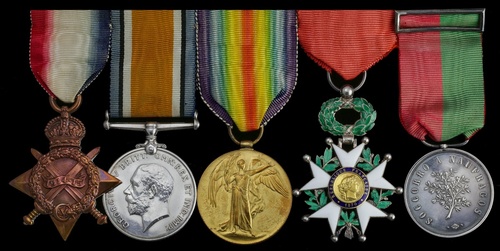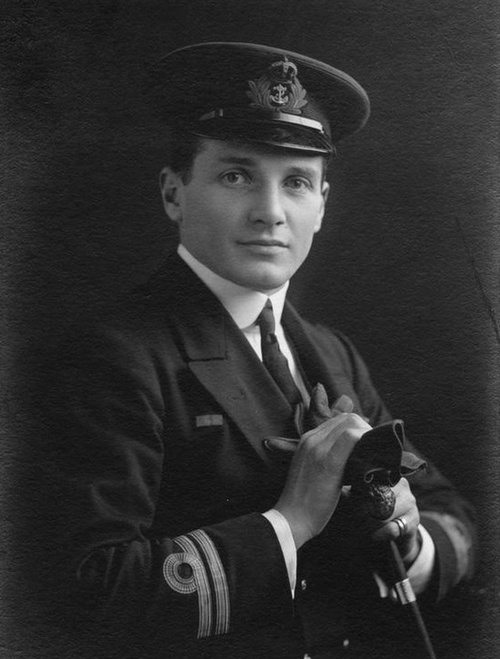Auction: 18001 - Orders, Decorations and Medals
Lot: 308
A rare Great War Legion of Honour group of five awarded to Commander F. P. O. Bridgeman, Royal Navy, who had earlier won the Portuguese Medal for Lifesaving for 'magnificent work in the most trying circumstances' when the steamer Lusitania came to grief on Bellow Rock, off Cape Town
He was subsequently present at Jutland aboard H.M.S. Marlborough, on which occasion the Iron Duke class battleship was badly damaged by a torpedo strike that ripped a 28ft. hole in her hull: Marlborough nonetheless expended 222 shells from her main and secondary armaments and gained notable hits on the S.M.S. Weisbaden and S.M.S. Grosser Kurfurst
1914-15 Star (Lieut. F. P. O. Bridgeman, R.N.); British War and Victory Medals (Lt. Commr F. P. O. Bridgeman, R.N.); France, Legion of Honour, Chevalier's breast badge, silver, silver-gilt and enamel; Portuguese Medal for Lifesaving, silver, mounted as worn by Spink & Son, London, good very fine and most likely a unique combination (5)
France Legion of Honour London Gazette 27 May 1919.
Francis Paul Orlando Bridgeman was born on 25 July 1888, the son of Brigadier-General Hon. Francis Charles Bridgeman, M.P., Scots Guards, and a grandson of the 3rd Earl Bradfield. No doubt under the patronage of his relative Admiral Sir Francis Bridgeman, G.C.B., G.C.V.O. (1828-1929), Francis entered Britannia as a cadet in September 1903; Sir Francis became First Sea Lord in 1911 but resigned after famously clashing with Winston Churchill.
Portuguese Medal for Lifesaving
Having been advanced to Lieutenant aboard the cruiser H.M.S. Hawke in November 1910, Francis won the thanks and appreciation of Their Lordships and the Governor-General of South Africa for his gallantry in lifesaving on 19 April 1911.
On that date, the Portuguese steamer Lusitania came to grief on the Bellow's Rock off Cape Town, the result of a navigational error caused by a shroud of mist in notoriously dangerous waters. The steamer, travelling somewhat 'innocently at speed, was stunned by the rock at approximately midnight'. Her crew and passenger compliment of 25 first class, 57 second class, 121 third class and 475 African labourers were greatly shaken by the sudden impact but Captain Faria remained calm and sent out signals of distress, which were picked up at Simon's Town, some distance away; fortunately the ship remained brightly lit, the collision sparing the engine-room and source of power.
Two tugs were soon on their way; the Scotsman, accompanied by a cutter with Lieutenant Bridgeman in charge, and the Forte. Aboard the Lusitania, human frivolity surfaced; the first lifeboat was 'sent over the starboard side,' where the swell was high. It was a bad mistake, for the lifeboat capsized and eight were drowned. The boats were then launched from port but one woman 'preferred to salvage her cashbox rather than to dump it and don a lifebelt as quickly as possible.' The ship began listing badly and by 1 o'clock the Lusitania's situation was desperate.
It was now that Bridgeman, in the cutter, proved to be a tower of strength in the ensuing rescue operation: 'The cutter did magnificently in the most trying conditions and brought the occupants of seven lifeboats to safety.' By 10 o'clock that morning, all on board had been evacuated, including the Captain, who initially refused to leave his ship until pleaded with by Bridgeman that there was no need for him to go down with the steamer; two days later, the ship slipped off the rock into 121 feet of water. For his bravery, Bridgeman was awarded the Portuguese Medal for Lifesaving, in silver.
Off to war - Dardanelles and Jutland
On the outbreak of hostilities in August 1914, Bridgeman was lent from Indefatigable for special service aboard the French flagship Suffren. On 26 September the Suffren and the battleship Verite were ordered to the Dardanelles to assist British ships in their blockade of the German battlecruiser S.M.S. Goeben and the light cruiser S.M.S. Breslau. On 3 November the French ships joined their British counterparts bombarding the Ottoman forts.
Bridgeman subsequently joined the Marlborough at the year's end, hence his subsequent part in the Battle of Jutland, as cited above.
Removing to the Revenge in February 1917, he came ashore for signalling duties and remained similarly employed until the war's end.
Bridgeman was placed on the Retired List as a Lieutenant-Commander in June 1928 and died in October 1930. He left instructions that his body should be given to the Medical School at St. Bart's Hospital, 'subject to the approval of his wife.'
Please see lot xxx for his miniature dress medals.
Subject to 20% VAT on Buyer’s Premium. For more information please view Terms and Conditions for Buyers.
Sold for
£1,300







